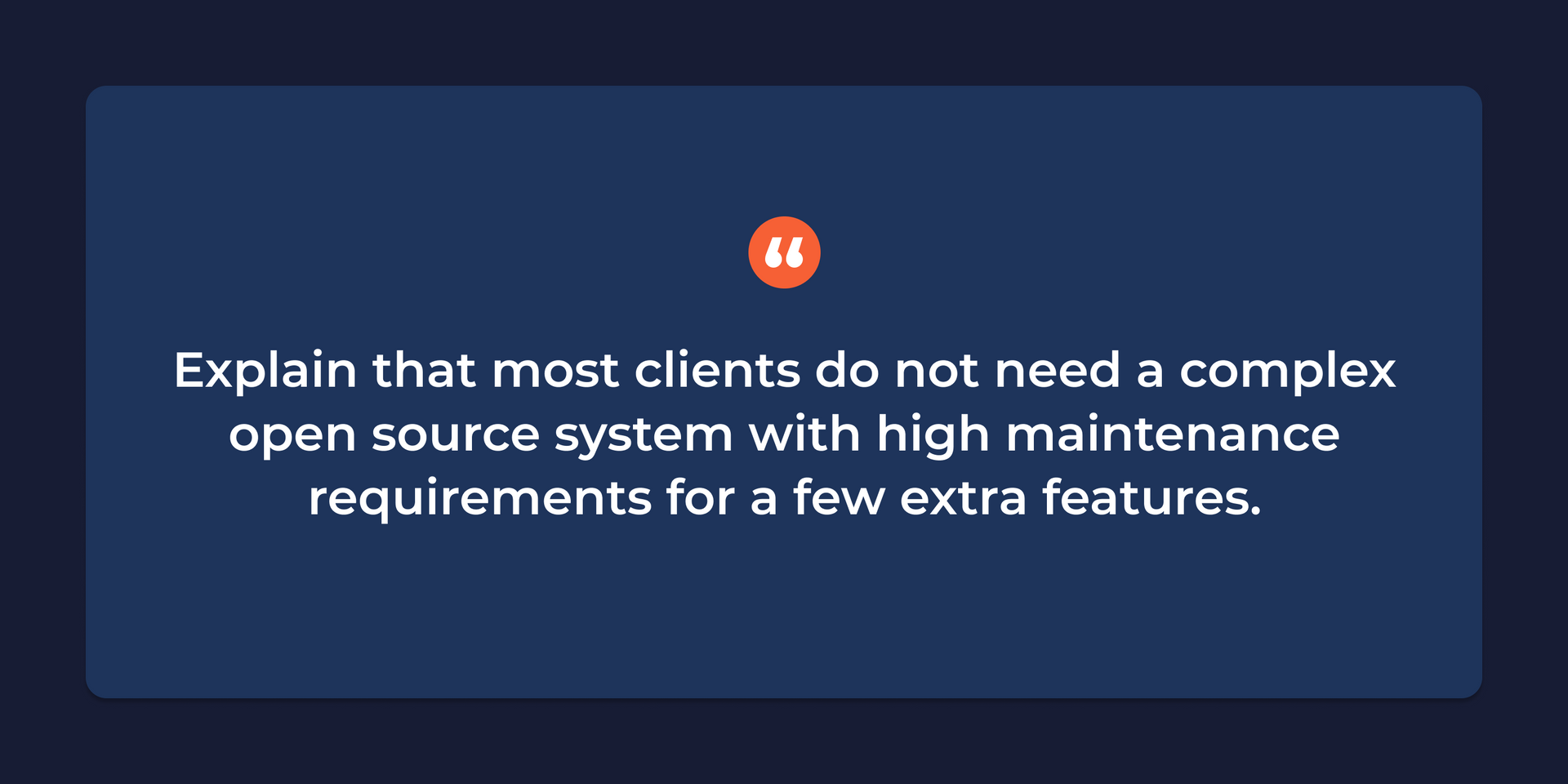In this content series, Scale and Thrive: Growth Insights for Agencies, by Agencies, we share proven tips and insights from agencies who scaled their operation and delivered proven growth. This blog post was written by Orel Y. Shalom, a successful agency owner with over a decade of experience in the field. Over the years, Orel has led more than 70 employees, producing over 10,000 websites for clients in a wide range of verticals.
Your
agency will likely face clients who hesitate working with a closed-code website building platform for several reasons. I’ll outline the concerns I’ve encountered over the years and I’ll shed light on how to exactly handle them.
Many clients fear that closed code systems will prevent them from migrating their website to another provider. They believe open source systems offer a wider range of features and are easier to migrate.
The strategy here is to explain that most clients do not need a complex open source system with high maintenance requirements for a few extra features. Reiterate that closed code systems provide an excellent solution for creating a branding website without the need to deal with code.
Also, it’s crucial that clients realize that choosing to build a website with an open-source platform can lead to significantly higher costs, both in terms of website development and ongoing maintenance.
Even if, down the line, the client considers switching a website provider –for any reason – it will still be more profitable to build a new website using a closed-source website builder and to simply transfer content rather than incurring substantial expenses when opting to build with an open-source platform, particularly considering that the website contents can be effortlessly replicated and transferred between closed-source platforms. So, from every perspective, choosing a closed-source platform for website creation emerges as a beneficial decision.
Security & Maintenance
I want us to look at WordPress, for example. It is open-source code but requires complex maintenance and is vulnerable to hacking. Let’s talk about WP hacking issues quickly.
It’s no secret that open-source platforms, like WordPress, have faced concerns regarding code visibility, potentially making it easier for hackers to exploit vulnerabilities. Quick internet searches reveal guides that demonstrate how even inexperienced individuals can attempt to hack WordPress sites, particularly if they haven't been updated to the latest version. This brings my attention to a significant challenge faced by WordPress sites—ensuring regular updates.
Unfortunately,
automatic maintenance is not typically performed, leading to outdated versions that are more susceptible to security breaches.
If you have clients updating a site without a thorough understanding of the platform, it can sometimes result in functionality issues, as conflicts may arise among various plugins that are not maintained for the latest version. Additionally, the use of open-source plugins, often developed by different individuals or teams, introduces security vulnerabilities that can be exploited or cause malfunctions within the website.
Let your clients know that agencies may spend a lot of time restoring hacked sites, and their clients may lose vital customer information and search engine rankings.
The benefits of an open source platform may not outweigh the damage caused by a security breach.
On the other hand, closed-source platforms are maintained as a unified system where all components work harmoniously together, meaning low risk of conflicting plugins or outdated elements. As such, their maintenance costs are low. These web platforms also provide a simpler solution with better security features. Look at Duda, for instance. What I like about Duda is that its code scripts are locked from hackers, which makes it less vulnerable to cyber attacks.
Design and Content
Open-source systems like WordPress often have templates with rigid structures. Content can only be added within the predefined page structure set by the template. In contrast, closed-source platforms offer the ability to easily incorporate elements and make changes, requiring no coding skills.
So, make sure your clients understand the trade-off: Achieving certain design flexibility in open-source web builders requires installing numerous plugins, which most likely will complicate maintenance efforts and negatively impact loading speed and SEO performance.
Generally speaking, content and design flexibility that comes with closed-source web building platforms saves the client time and makes them more independent. Closed-source systems like Duda, for instance, prioritize end-user friendliness, empowering clients to manage their websites without being entirely dependent on an agency. For one, Duda has
built-in client management tools where you can provide access and permissions to multiple clients in bulk.
When talking to a client, I like telling them they don't need a bus to get home; a private car is enough. In this case, think of open-source web builders as buses. They may present a multitude of additional features, but most business owners find that they don't require such complexities to build or maintain a website. Instead, they prioritize simplicity, cost-effective maintenance, user-friendly website management systems, and the reliability and stability necessary to ensure their websites remain secure and operational, free from hacks, crashes, or unexpected downtime.
Code Fixes
I recommend conveying to hesitant clients that
a functioning website is crucial for peace of mind of an agency owner. Extensive changes to an open-source platform, such as WP, can result in trying to find a WP developer who will agree to fix any existing code issues, which, oftentimes, requires for the site to be rebuilt multiple times and, therefore, negates the benefits of open-source.
Don’t get me wrong, there are plenty of WP developers out there. It’s just that when it comes to fixing code that was developed by another developer, many WordPress developers prefer to build a new site from scratch because working with existing code has, most often than not, its own unique challenges and complexities - you know where I’m going with this.
Closed-source platforms offer joint maintenance, automatic updates, and fast response to requests. Their user-friendly interfaces allow for easy content editing with minimal outside assistance. Additionally, these systems ensure maximum stability through real-time backups on international servers. Achieving the same level of stability in open source can cost an agency owner thousands of dollars per month.
SEO Optimization Capabilities
Closed code platforms come with built-in optimization for Google, allowing for high search engine rankings.For instance, I know that agencies utilizing Duda's website building platform can create SEO-ready sites with high performance scores on
Core Web Vitals. On the other hand, open source requires significant resources to achieve comparable performance.
Final Thoughts
Conquering client concerns surrounding closed-source web building platforms is within reach with the right strategies in place. Outline the full range of possibilities, dive into the cost-benefit ratio, and show your clients how they can exponentially grow their business by making the most out of the closed-source web platform potential.
But what if your client thinks they just need a Facebook page or a business directory? Meet me in my next blog post where I’ll explain how to go about such specific sales objections in website building every agency should know how to handle with finesse.
Related Posts
By Renana Dar
•
February 23, 2026
Discover how AI design tools can boost your agency’s efficiency, streamline your design process, and help you deliver high-quality work faster. Explore top AI-powered design tools available now.
By María Vincenzini
•
February 17, 2026
Compare leading tools like Aspire, Influencer Hero, Upfluence, Traackr, and CreatorIQ. See how top platforms help agencies and brands streamline creator outreach, manage campaigns at scale, track affiliates, and prove ROI with real performance data.
By Amy Greene
•
February 12, 2026
AI tools offer speed, but only solid systems deliver true agency scale and profit. Learn the three pillars for integrating AI into a structured, high-growth framework.
Show More









